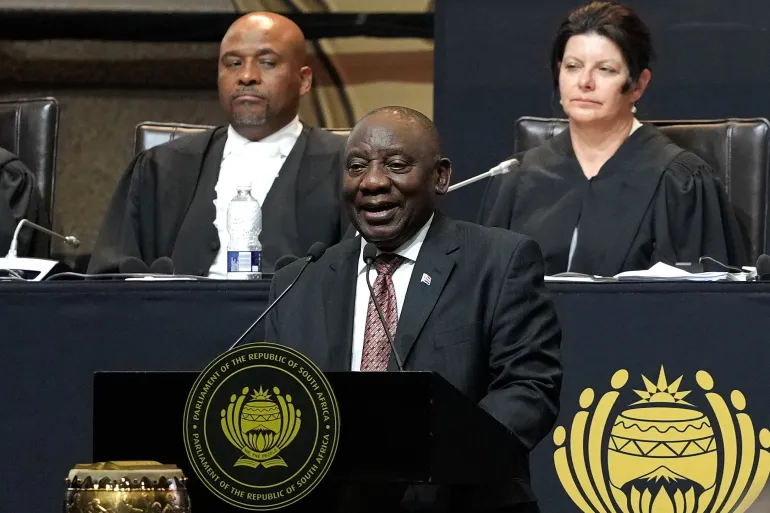South Africa’s President Cyril Ramaphosa has been reelected for a second term by lawmakers, following a historic coalition agreement between his African National Congress (ANC) of the late Nelson Mandela and the Democratic Alliance (DA), setting aside their long-standing rivalry.
Ramaphosa secured the late Friday vote with 283 votes, defeating Julius Malema, leader of the far-left Economic Freedom Fighters (EFF), who received 44 votes.
Earlier, the DA, which pushes a liberal, free-market agenda, announced it would support Ramaphosa as part of an agreement with the ANC, the party that led the anti-apartheid struggle, to form a unity government. Critics argue that the DA prioritizes South Africa’s white minority, an accusation the party denies.
The move reflected Ramaphosa’s centrist approach, which prevailed over more left-wing factions within the ANC advocating alliances with parties favoring nationalization and land seizures from white farmers.
The ANC, for the first time since 1994, lost its parliamentary majority in the May 29 elections, with its vote share plummeting from 57.5% in 2019 to 40.2% due to defections amid chronic unemployment and declining public services.
The DA, which garnered nearly 22% of the vote, agreed to back Ramaphosa’s reelection, while its MPs will support an ANC candidate for parliament speaker in exchange for the deputy speaker position, DA leader John Steenhuisen announced.
“Through their votes, the people have made it clear that they do not want any one party to dominate our society,” he said at a press briefing after legislators were sworn in at a Cape Town convention center.
“The people have also told us that the time for finger-pointing is over and that the time for a new politics of collaboration and problem-solving has arrived,” Steenhuisen indicated.
An ANC-DA coalition is favored by large businesses and international investors, with Ramaphosa, 71, expected to continue promoting policies, such as allowing the private sector to generate renewable energy.
Negotiations on policies and cabinet positions will continue, Steenhuisen confirmed, noting that the constitutional two-week period after election results for electing a president is insufficient for finalizing a full coalition agreement.
A “statement of intent” signed by the ANC and DA commits to a “merit-based, nonpartisan and professional civil service.” The DA has long criticized the ANC’s practice of appointing supporters to public sector positions, which it claims fosters corruption.
ANC Secretary-General Fikile Mbalula said on Friday the coalition brings together a majority of the 18 parties that won representation in the 400-seat National Assembly.
These include the Zulu nationalist Inkatha Freedom Party, the Patriotic Alliance (PA), and other smaller groups.
The ANC’s vote share plummeted significantly due to the emergence of the new uMkhonto weSizwe (MK) party, named after the ANC’s armed wing during apartheid. Launched by former President Jacob Zuma, the MK party unexpectedly secured 14.6% of the vote, coming in third place just six months after its formation.
The MK party boycotted the parliament’s opening after its legal challenge to the election results was dismissed by the top court. It has refused to collaborate with the ANC under Ramaphosa’s leadership, insisting potential coalition partners must respect the constitution.
Meanwhile, the far-left Economic Freedom Fighters (EFF), whose MPs were sworn in wearing their signature red overalls, declined Ramaphosa’s invitation to join a Government of National Unity (GNU). EFF leader Julius Malema, who founded the Marxist party in 2013 after being expelled from the ANC, rejected any alliance with the “neo-colonial” DA, labeling it “our enemy”.
“This is not a government of national unity, this is a grand coalition between the ANC and white monopoly capital. History will judge you harshly,” Malema said, after conceding defeat.
Source: AlMayadeen



